The Fighter
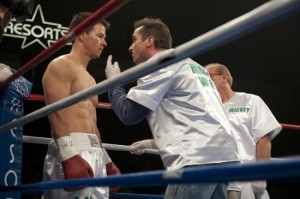 Being a midget can have its advantages, especially in the world of TV acting. This is because what plays best on camera, specifically in close-up, is to have a big head and a small body. That’s why most actors are so short and have enormous heads. A lot of the major action stars of the last 20 years, Sylvester Stallone, Jean-Claude Van Damme, Tom Cruise, etc. were tiny people with foreheads big enough to project their own movie on it. Robert Rodriguez’s Desperado is an action-western that also doubles as a veritable little people convention. Rodriguez, ever the energetic and inventive filmmaker, shot his two minuscule leads, Antonio Banderas (5 ft. 8 inches) and Salma Hayek (5 ft. 2 inches) , primarily from low angles, making them look enormous. Banderas is supposed to be larger than life in the movie and it helps that one of his adversaries is the 5 foot 6 inch Cheech Marin. What does it say that of the movie stars in Desperado, Steve Buscemi is the tallest?
Being a midget can have its advantages, especially in the world of TV acting. This is because what plays best on camera, specifically in close-up, is to have a big head and a small body. That’s why most actors are so short and have enormous heads. A lot of the major action stars of the last 20 years, Sylvester Stallone, Jean-Claude Van Damme, Tom Cruise, etc. were tiny people with foreheads big enough to project their own movie on it. Robert Rodriguez’s Desperado is an action-western that also doubles as a veritable little people convention. Rodriguez, ever the energetic and inventive filmmaker, shot his two minuscule leads, Antonio Banderas (5 ft. 8 inches) and Salma Hayek (5 ft. 2 inches) , primarily from low angles, making them look enormous. Banderas is supposed to be larger than life in the movie and it helps that one of his adversaries is the 5 foot 6 inch Cheech Marin. What does it say that of the movie stars in Desperado, Steve Buscemi is the tallest?
That’s why it’s not a big deal that Mark Wahlberg, the star of David O. Russell’s The Fighter is a rather diminutive fellow. The Fighter is a biopic of a certain period of boxer Micky Ward’s life, and if they only got one thing right, since Wahlberg looks nothing like Ward (and wasn’t left handed like Wahlberg) and didn’t even dye his hair the same color as Ward’s (blond) for the role, it’s that Ward and Wahlberg are the same height. Russell isn’t forced to be creative with the camera to fool us, but then again he’s not particularly creative with anything else in the movie either.
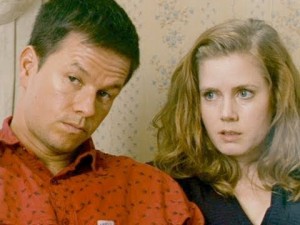 It’s a shame because Russell had previously done well to work within the studio system while still making distinctive films such as with Flirting With Disaster and Three Kings, but perhaps since he hasn’t had a film distributed since 2004’s I Heart Huckabees, he wanted to play it safe (Russell has a terrible reputation in the industry based on his highly publicized feuds with George Clooney and Lily Tomlin). And Micky Ward is not a bad subject for a movie, especially in the wake of The Fighter executive producer Darren Aronofsky’s film The Wrestler. Russell adopted a lot of the same style that Aronofsky used in The Wrestler and Black Swan, keeping the camera very close to the actor’s heads/ears and paring down the imagery to a minimalist level.
It’s a shame because Russell had previously done well to work within the studio system while still making distinctive films such as with Flirting With Disaster and Three Kings, but perhaps since he hasn’t had a film distributed since 2004’s I Heart Huckabees, he wanted to play it safe (Russell has a terrible reputation in the industry based on his highly publicized feuds with George Clooney and Lily Tomlin). And Micky Ward is not a bad subject for a movie, especially in the wake of The Fighter executive producer Darren Aronofsky’s film The Wrestler. Russell adopted a lot of the same style that Aronofsky used in The Wrestler and Black Swan, keeping the camera very close to the actor’s heads/ears and paring down the imagery to a minimalist level.
Now it would be very easy to pick apart what The Fighter gets wrong about Ward’s life in terms of his fights and the chronology of events, but as a friend pointed out after the screening, it’s not a boxing movie, it’s a standard drama that happens to have boxing in it. So for those like myself who know a lot about boxing, you can scroll down to the bottom of this review* and will pick apart what’s incorrect, often changed for no apparent reason. Everyone else who just want to see The Fighter examined as a dramatic movie, truly the only fair way to look at it, should stay in this paragraph.
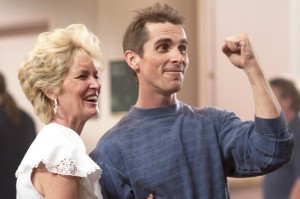 Not that there’s all that much drama in The Fighter, it’s mostly a broad sitcom with no real central character. Ward, an energetic and friendly presence in real life, is reduced to being ordered around by his barmaid girlfriend (Amy Adams, who dresses down very well) and not saying much. He’s a puppet in his own biopic. So the heavy lifting goes to Christian Bale as Ward’s brother and trainer (Dickie Eklund) who hasn’t dealt with his own retirement from boxing very well and becomes a crack addict. Bale is shockingly gaunt in the first scene of the film, but there’s nothing else for him to do, apart from a couple of slapstick scenes where he falls out of a window trying not to get caught doing drugs by his mother. It’s a rollicking sitcom about crack addiction.
Not that there’s all that much drama in The Fighter, it’s mostly a broad sitcom with no real central character. Ward, an energetic and friendly presence in real life, is reduced to being ordered around by his barmaid girlfriend (Amy Adams, who dresses down very well) and not saying much. He’s a puppet in his own biopic. So the heavy lifting goes to Christian Bale as Ward’s brother and trainer (Dickie Eklund) who hasn’t dealt with his own retirement from boxing very well and becomes a crack addict. Bale is shockingly gaunt in the first scene of the film, but there’s nothing else for him to do, apart from a couple of slapstick scenes where he falls out of a window trying not to get caught doing drugs by his mother. It’s a rollicking sitcom about crack addiction.
That sitcom continues when Ward’s sisters enter the picture, upset that Ward wants to fight without Dickie in his corner or their irresponsible mother Alice as his manager (a cartoon performance by Melissa Leo). The sisters, all 9 of them, wearing flip-flops, ranging from middling looking to hideous, but all with enormous foreheads, cramp into one small car. When they arrive at Adams’ house to confront her and Micky/Wahlberg, they exit like they’re doing a clown car trick. I’m sure in real life that Micky’s sisters are eccentric and strong-willed, but since the movie plays so liberally with known facts about Ward, why resort to cheapening the movie if you didn’t have to?
 Sadly the Ward sisters provide what little there is of energy to the film, the movie is at a low ebb for its entirety. The musical choices are so on-the-nose as to make you do double takes. How do we know that Micky has his heart back in the fight game and is ready to commit fully? Why, we hear Aerosmith’s Back in the Saddle. How do we know we’re watching a movie where everything is black and white (Ward’s unseen histrionic ex-wife threatens to take away visitation privileges!), and the goal is for the filmmaking to be as unambitious as possible? Why, we hear the Red Hot Chili Peppers play the frustratingly appropriate Strip My Mind.
Sadly the Ward sisters provide what little there is of energy to the film, the movie is at a low ebb for its entirety. The musical choices are so on-the-nose as to make you do double takes. How do we know that Micky has his heart back in the fight game and is ready to commit fully? Why, we hear Aerosmith’s Back in the Saddle. How do we know we’re watching a movie where everything is black and white (Ward’s unseen histrionic ex-wife threatens to take away visitation privileges!), and the goal is for the filmmaking to be as unambitious as possible? Why, we hear the Red Hot Chili Peppers play the frustratingly appropriate Strip My Mind.
It’s not that mediocrity can’t be a valid subject for a biopic, if anything it would have helped The Fighter if it acknowledged Ward’s many limitations as a boxer. And there are moments where the acceptance of working class mediocrity comes across well (though the Lowell, MA we see could be any old place, unlike the way that Ben Affleck used Boston in The Town), such as the scenes where HBO is filming a documentary about crack addiction with Dickie at its center, even though he’s convinced himself that the movie is about his boxing comeback. When the documentary finally runs on TV, Alice, who had been making excuses for years, finally comes to terms with her son’s drug problem, as if it’s not real if she didn’t see it on TV.
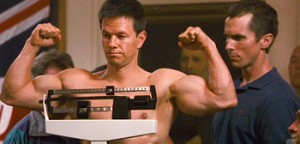 However, The Fighter is too focused on fulfilling its genre expectations to follow interesting tangents. It tells you everything you need to know that the most famous and most entertaining fights of Ward’s career, his fight of the year against Emanuel Augustus and his trilogy with Arturo Gatti (their first fight was voted the 2nd best fight of the 2000-2010 decade) merit only a mention in the closing credits. What kind of movie eschews the most dramatic parts of a person’s life? Apparently, this one.
However, The Fighter is too focused on fulfilling its genre expectations to follow interesting tangents. It tells you everything you need to know that the most famous and most entertaining fights of Ward’s career, his fight of the year against Emanuel Augustus and his trilogy with Arturo Gatti (their first fight was voted the 2nd best fight of the 2000-2010 decade) merit only a mention in the closing credits. What kind of movie eschews the most dramatic parts of a person’s life? Apparently, this one.
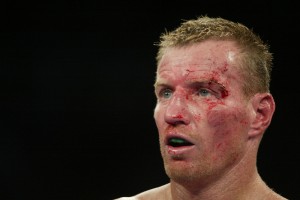 * Some spoilers for the movie, but nothing that any self-respecting boxing fan might be able to find out on their own: In the movie, the fight that leads to Ward’s firing of his mother/manager and his trainer/brother was against Max Mungin, who was called in as a last minute replacement for the fighter that Ward had trained for. It’s true that Mungin had been inactive for a three year stretch not long before the fight, but the weight differential we’re shown is a gross exaggeration as was the way the fight was presented. The movie claims that Mungin was fighting as a super-middleweight (168 pounds) and Ward was fighting as a Welterwight (147 pounds). It’s true that there was a significant weight difference between the two fighters, but Mungin never fought above Welterweight in his entire career (except for one catchweight fight in 1983) and Ward weighed in at 136 for the Mungin fight (a shade above lightweight). The likelihood that Mungin blew up significantly on fight night is not high as he wasn’t expecting to fight, but Ward likely did increase his weight on fight night, suggesting that there wasn’t much of a weight difference during the fight. It’s possible that the weight difference was a parallel to the Arturo Gatti-Joey Gamache fight, considering Ward’s most famous fights were against Gatti, but I’m probably giving David O. Russell too much credit. The movie also presents Ward as having taken a hellacious, one-sided beating from Mungin, but he actually lost a very close decision on all three cards. The time jump that occurs in the movie is much less than reality, as Ward retired from 1991-1994 not after the Mungin fight, but 3 years and 8 fights later, after getting decisioned four times in a row.
* Some spoilers for the movie, but nothing that any self-respecting boxing fan might be able to find out on their own: In the movie, the fight that leads to Ward’s firing of his mother/manager and his trainer/brother was against Max Mungin, who was called in as a last minute replacement for the fighter that Ward had trained for. It’s true that Mungin had been inactive for a three year stretch not long before the fight, but the weight differential we’re shown is a gross exaggeration as was the way the fight was presented. The movie claims that Mungin was fighting as a super-middleweight (168 pounds) and Ward was fighting as a Welterwight (147 pounds). It’s true that there was a significant weight difference between the two fighters, but Mungin never fought above Welterweight in his entire career (except for one catchweight fight in 1983) and Ward weighed in at 136 for the Mungin fight (a shade above lightweight). The likelihood that Mungin blew up significantly on fight night is not high as he wasn’t expecting to fight, but Ward likely did increase his weight on fight night, suggesting that there wasn’t much of a weight difference during the fight. It’s possible that the weight difference was a parallel to the Arturo Gatti-Joey Gamache fight, considering Ward’s most famous fights were against Gatti, but I’m probably giving David O. Russell too much credit. The movie also presents Ward as having taken a hellacious, one-sided beating from Mungin, but he actually lost a very close decision on all three cards. The time jump that occurs in the movie is much less than reality, as Ward retired from 1991-1994 not after the Mungin fight, but 3 years and 8 fights later, after getting decisioned four times in a row.
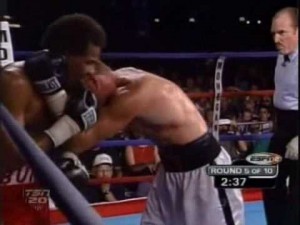 The movie does show the 1997 Micky Ward vs. Alfonso Sanchez fight using actual audio from the HBO broadcast, but it misses the best part of the fight, that being Ward constantly banging his gloves together in frustration. The suggestion the movie provides is that the Sanchez victory led to Ward’s title fight against Neary. While it’s true that Ward got a legit title shot as a result of knocking out Sanchez, it was actually against Vince Phillips who stopped Ward in 3 rounds. Ward even got another title shot, albeit a trinket, less than a year after his loss to Phillips, but was totally outclassed by Zab Judah. The movie never acknowledges what a mediocre club fighter Ward was, and if anything the Judah fight would have been exhibit A.
The movie does show the 1997 Micky Ward vs. Alfonso Sanchez fight using actual audio from the HBO broadcast, but it misses the best part of the fight, that being Ward constantly banging his gloves together in frustration. The suggestion the movie provides is that the Sanchez victory led to Ward’s title fight against Neary. While it’s true that Ward got a legit title shot as a result of knocking out Sanchez, it was actually against Vince Phillips who stopped Ward in 3 rounds. Ward even got another title shot, albeit a trinket, less than a year after his loss to Phillips, but was totally outclassed by Zab Judah. The movie never acknowledges what a mediocre club fighter Ward was, and if anything the Judah fight would have been exhibit A.
The Neary fight didn’t happen until 3 years after the Sanchez knockout, but though the movie pretends that Ward had never won a title or even fought for one at that point, he’d actually won the very same WBU title that he got from Neary, all the way back in 1996, before the Sanchez fight. The movie not only leaves out Ward’s best fights, the Gatti trilogy, his fight with Emanuel Augustus, but the actual surprise knockout that led to the Neary fight, where Ward, an enormous underdog and way down on the cards, pulled out the fight with 20 seconds to go against Reggie Green.
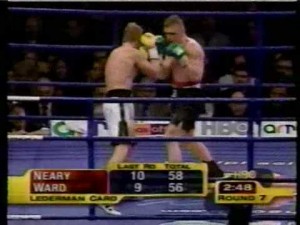 As for the Neary fight, the movie presents it as a brawl, with both fighters going down in the 8th round. In real life, Ward never went down in the fight, and his out-of-nowhere comeback that the movie presents wasn’t necessary, as the fight was fairly even on all 3 cards (Neary would have won a split decision if the fight had ended after round 7). And the moment of the movie where Micky comments that his first name doesn’t have an “e” in it even though it says “Mickey” on the back of one of his cornermen’s uniforms is inaccurate. If you watch the actual fight, you can see that his name is spelled correctly on their uniforms during Ward’s entrance. As a final nitpick, I’ll point out that though some of the audio is used from the original HBO broadcast, some of it is from Ward-Gatti I, and there are comments from Roy Jones and George Foreman, who never worked together on the same fight for HBO, as they served the same purpose.
As for the Neary fight, the movie presents it as a brawl, with both fighters going down in the 8th round. In real life, Ward never went down in the fight, and his out-of-nowhere comeback that the movie presents wasn’t necessary, as the fight was fairly even on all 3 cards (Neary would have won a split decision if the fight had ended after round 7). And the moment of the movie where Micky comments that his first name doesn’t have an “e” in it even though it says “Mickey” on the back of one of his cornermen’s uniforms is inaccurate. If you watch the actual fight, you can see that his name is spelled correctly on their uniforms during Ward’s entrance. As a final nitpick, I’ll point out that though some of the audio is used from the original HBO broadcast, some of it is from Ward-Gatti I, and there are comments from Roy Jones and George Foreman, who never worked together on the same fight for HBO, as they served the same purpose.



